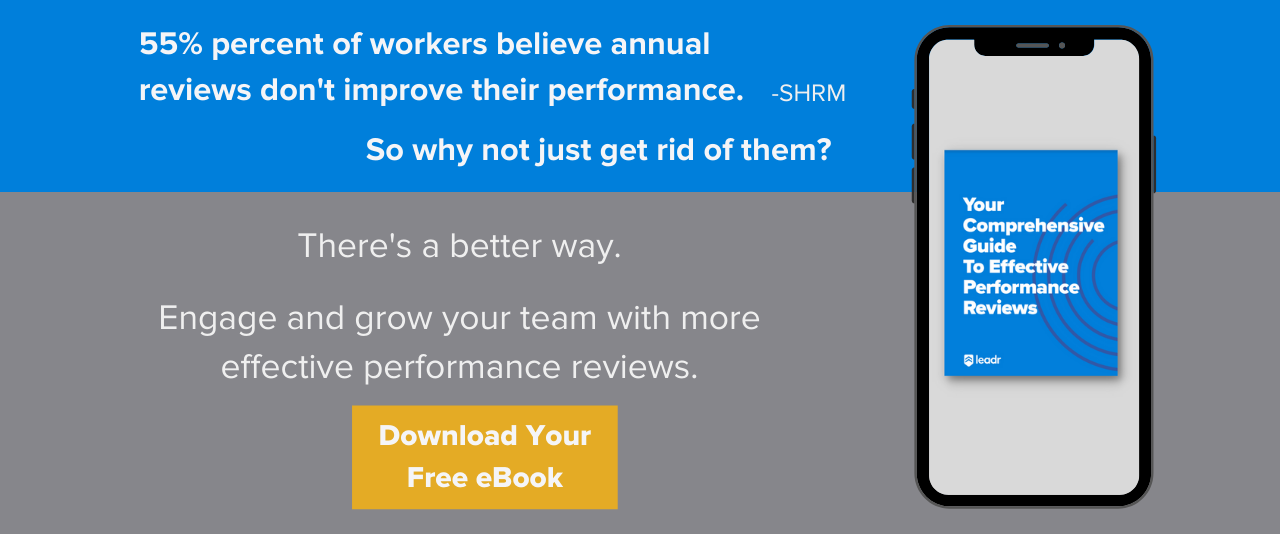3 Ways To Prioritize People Development In Performance Reviews
The shift from people and project management to people development can transform your perspective on your work. Instead of focusing your energy on the highs of winning and numbers and the lows of mistakes, losses, or declines, you’re instead putting yourself on a steadfast track towards growth. As a result, you’ll see your team build strength in measurable increases over time as they lean into their personal strengths and individual skills and as you develop and lead them to lead others.
This will ultimately lead to long-term satisfaction, retention, clearer communication and more efficient processes, and ultimately, better business. But how do you get there?
One place to start is with the performance review. As with all feedback you’re giving to your team, this should not be a one-time conversation; but instead, it’s a filter that your team uses to guide and shape their work.
The performance review should be the capstone to a whole portfolio of conversations that you’ve had with your team members. Gallup research found that when managers provide weekly (vs. annual) feedback, team members are:
-
5.2x more likely to strongly agree that they receive meaningful feedback
-
3.2x more likely to strongly agree they are motivated to do outstanding work
-
2.7x more likely to be engaged at work
Consistent, quality feedback will remind your team of their value and potential and allow them space to pursue passions and improve weaknesses with confidence and joy in their job.
Historically, this is a radical shift from most employees’ thinking of an annual review. Here are three ways you can structure your performance reviews that prioritize people development for better results in the long run:
1. Build rapport.
When entering the performance review and considering how to deliver feedback, check your motivation. Your goal should always be to help your staff improve and grow into their personal strengths, not to adapt them to your version of perfection for your benefit. When your team believes you are for them and on their side, you will more easily foster space for open and honest conversations that lead to growth and self-reflection. In addition to having caring conversations consistently in one on ones that communicate personal investment in their development as well as what’s going on in their lives (to a certain extent), encourage self-awareness and reflection by asking team members to ask themselves questions that will lead to eye-opening realizations and inner growth.
Seth Godin has an insightful list of these on his blog that he calls a “soft skills inventory.” Sometimes the development of these skills leads to more growth and better quality work than any training or professional development can offer. These are excellent questions to introduce in performance reviews and then revisit during one-on-one meetings each week to track progress. Some of our favorites include:
-
What am I better at?
-
Have I asked a difficult question lately?
-
Do people trust me more than they did?
-
Who have I developed?
-
Have I had any significant failures (learning opportunities) lately, and what have I learned?
-
Who have I helped? Especially when there was no upside for me…
-
Am I more likely to be leading or following?
As a Leadr user, you can add these questions to your performance reviews or meetings and assign content related to these skills that correlates to a more profound question
Ultimately, your performance review conversations will build a foundation of open and honest relationships and a culture of trust. As a result, your team can trust that feedback is for their good and their future at the company vs. a dreaded punishment.
2. Create clarity.
The annual review conversation is an excellent opportunity to create alignment, not just on your team but company-wide. Is everyone on the same page about the mission and vision of the organization? Do they see the big picture of where the company is headed and how they can be a part of that? What strengths do they bring to the team, and where are they weaker that they could work on?
Essentially, what’s working and what’s not, and how do we adjust for that?
These are critical questions to reflect on. They’re also a great starting place for team members to share ideas, give you feedback on leadership or processes, and bring to light concerns about weaknesses in culture or struggles they are facing.
So how do you create this kind of vulnerability and trust? Create clarity.
Before you and your team start building your reviews, ensure you’re aligned on what will be discussed, how they will be evaluated, what’s at stake, and anything else they should expect. Align on what they need to bring with them and be prepared to discuss. Reducing anxiety by providing clarity is a huge win.
Keep this in mind as you close out your review conversation, too. Make sure you and your team members know their goals moving forward and any major takeaways from the review conversation.
What you both learn in these conversations will help you craft the strongest team to join the work that the rest of the company is doing to work together. This cohesive spirit flourishes with clarity.
This clarity is best refined in conversations and coaching over time - one on ones are essential. You’ll find that future great results will be born from present great reflection.
3. Maximize potential and growth.
Another way to structure your performance reviews to prioritize development is to focus on how you can maximize each team member’s potential. Consider asking them, are they excited about what they can contribute using their unique gifts and skills, and are they in the right role to create longevity for both them as an individual and for their team and the organization as a whole?
This plays out in two ways:
-
Feedback - Again, strive to adopt a coach-based mindset rather than a management-based approach. According to Forbes, 60% of Generation-Z’ers want multiple check-ins from their managers weekly, if not daily. The fastest growing percentage of our workforce is hungry for feedback and growth. Take advantage of that opportunity to develop an outstanding team.
-
Develop Unique Strengths - Another crucial part of this is recognizing each employee’s unique strengths and how those strengths are used to help the team succeed. Personality assessments are not only fun but also a helpful tool when first starting out with strengths-based leadership.
As you do this, you’ll also likely see opportunities for team members to step into leading others. For example, maybe they are ready for the next step like a promotion in title or greater responsibility (although we believe these and conversations about compensation should be separate from the annual review conversation), and would benefit from a Growth Track program or other mentoring or leadership development programs.
Investing in their personal development will reinforce your dedication to their potential and your recognition of the work they’ve put in - all things that go a long way in strengthening your team’s morale and catalyzing them for reaching even greater goals.
Our research has shown us that the highest performing teams share these three foundational elements to build a better - and different - structure for performance and reviews.
One last critical piece is that of psychological safety, the belief that it is safe to speak up with differing opinions and new ideas and take a chance on risk-taking experiments within the team without fear of punishment. When you prioritize people development in all of your processes, your team will feel empowered in this area - to speak up and try new things and all of that ultimately leads to growth, productivity, clarity, and customer success.
This information is a summary of one section from our Staff Reviews eBook. Access the complete guide packed with data, case studies, and trends moving forward for free here.
So now that you have a fresh vision to work with for your performance reviews, tell us, what questions sparked conversation on your team? Share in the comments how this is helping you and your team members prioritize development and growth
Share this
You May Also Like
These Related Stories

Are Performance Reviews Outdated?

A Comprehensive Review of the Performance Review






No Comments Yet
Let us know what you think